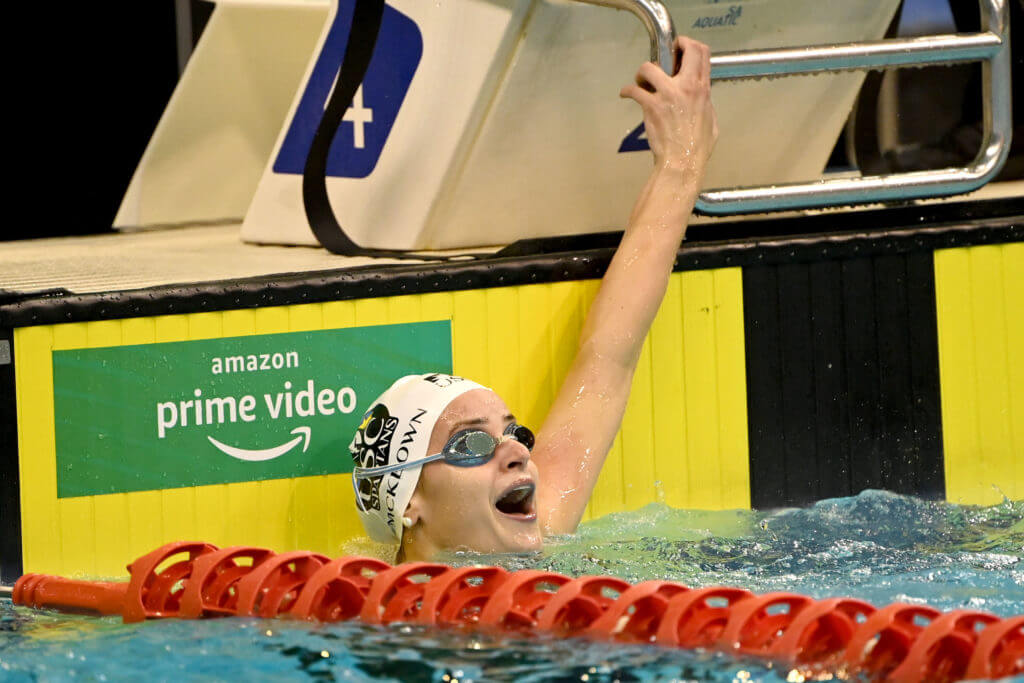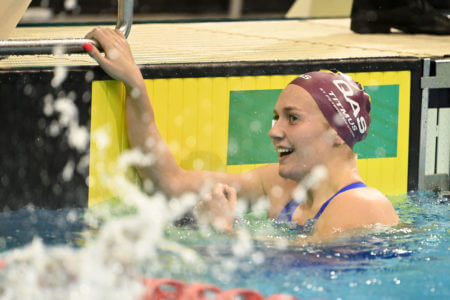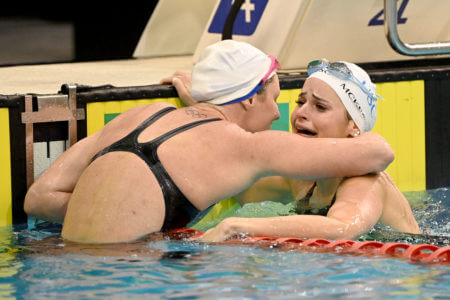Can Kaylee McKeown and Ariarne Titmus Return Australia to Olympic Glory?

Can Kaylee McKeown and Ariarne Titmus Return Australia to Olympic Glory?
As the swimmers at the U.S. Olympic Trials woke up Sunday morning, the gauntlet had already been thrown. The Australian and American Trials happening concurrently was inevitably going to produce some fascinating time comparisons with the world’s two foremost swimming powers racing on opposite sides of the world, and Kaylee McKeown and Ariarne Titmus each swam incredible times that directly challenge more established American rivals.
It’s hard to be too surprised by McKeown taking down Regan Smith’s 100 back world record. McKeown had been chipping away at Smith’s 57.57, set at the 2019 World Championships, all year, and she swam a 57.63 last month before her 57.45 at the Trials in Adelaide. Titmus, on the other hand, had been quiet in 2021 after dealing with a shoulder injury late last year, but she crushed her best time Sunday with a 3:56.90 (compared to a previous best of 3:58.76 from the 2019 World Championships). World record-holder Katie Ledecky has only beaten that swim one time, when she won Olympic gold in Rio in 3:56.46.

Ariarne Titmus after swimming a 3:56.90 in the women’s 400 free — Photo Courtesy: Delly Carr/Swimming Australia
Certainly, these performances are just the first in the informal McKeown-Smith and Titmus-Ledecky rivalries, and the American counterparts will go in the same events Monday and Tuesday at the U.S. Trials in Omaha. Smith said last month that she is happy for all of McKeown’s success and that she does not view her competition with McKeown as cutthroat. Ledecky said Saturday that she won’t be paying too close attention to times recorded this week Down Under. But there will be comparisons, for sure. Maybe the Americans swim faster, maybe not. Odds are, probably not.
However, the medals are not awarded until the Olympics begin in Tokyo, and Australia’s recent record in Olympic swimming is not great. In 2012, the Australians won gold in the women’s 400 free relay on the first night of Olympic swimming but failed to win any more gold medals after that, despite entering with the pre-race favorites in multiple events. In 2016, most projections had Australia equaling or surpassing the American medal tally, but the U.S. captured 16 gold medals and 33 total medals, compared to just three golds and 10 total medals for Australia.
Two of those golds were on day one, when Mack Horton captured first place in the 400 free and the Aussie women defended their 400 free relay title. After that, Kyle Chalmers provided a special moment by winning gold in the men’s 100 free, but the meet was full of disappointing results. Specifically focusing on the women, Emily Seebohm ended up seventh in the 100 back after entering as the favorite, and gold-medal favorite Cate Campbell and her younger sister and reigning world champion Bronte Campbell failed to win a medal in either the 50 or 100 free.
The Americans, by contrast, have come to see Olympic success as a given, thanks to a run of resoundingly successful Games in Rio and in London before that. In a press conference Saturday, U.S. women’s head coach Greg Meehan pointed out that almost no one remembers times from Trials, just from the results from the Games. American breaststroker Lilly King was so confident in herself and her American team that she predicted that she said, “personally, I think the women, if we have the meet we can have, can win every single individual gold. I think that would be—that would be pretty cool, right? But really, just looking at it, I think that is a genuine possibility.”
Even the Australians are buying into the American success, so much that they moved their Olympic Trials from their typical late March/early April timeslot to June, just over a month out from the Olympics, just like the Americans. There’s nothing wrong with trying to copy a successful formula, and certainly, the run of Olympic disappointments would make any country with such high expectations for their swimmers eager to try something different.

Emily Seebohm congratulates Kaylee McKeown after McKeown lowered the world record in the women’s 100 back — Photo Courtesy: Delly Carr/Swimming Australia
So is 2021 the year Australia gets the job done and becomes the swimming powerhouse nation on par or above the United States? It was not that long ago when Australia clearly held that No. 1 title on the women’s side as they swept all three women’s relays at the 2008 Olympics in Beijing. And while some of the faces in Tokyo will be familiar—Seebohm qualified for her fourth straight Olympics by finishing second behind McKeown in the 100 back, and Cate Campbell will surely earn her fourth Olympic ticket as well in the coming days—neither McKeown nor Titmus was around in London or Rio.
Indeed, international success is all these two swimmers know. Back in 2017, McKeown made her international debut at the World Championships and finished fourth in the 200 back, and she captured an impressive silver medal in the event fifth in the 100 back in 2019. Titmus broke onto the world scene by finishing fourth in the 400 free at her first World Championships before upsetting Ledecky at the 2019 meet and earning four medals total (two gold) in Gwangju.
And peeking slightly ahead towards the Tokyo Games, Titmus has no shortage of confidence either in her abilities or the potential of her Australian team. “(Ledecky) is not going to have it all her own way I guess. I can’t control what she does, I can’t only control myself. I’ll do the best I can and put myself in a position to win a gold medal it’s going to be a tough race,” Titmus said.
“After Kaylee tonight I think the backstroke is gone. I think we have chances in a lot of events. I’m sure the Olympics will not go all America’s way.”
Titmus is absolutely correct: Australia does have a loaded squad. But the full verdict won’t be in until they can achieve at the Olympic Games what Australia has failed to do in both London and Rio.
Maybe McKeown and Titmus are the duo to lead Australia’s women back to Olympic glory. But given Australia’s results from the past two Games, significant doubts will linger until they actually achieve that golden finish.





Interesting article … I think it was written with the goal of firing up the American swimmers, especially the last few paragraphs of supposed sound bites demonstrating arrogance, and ending with an emphasis on Australia’s crappy Olympic history .. well played
I don’t know where we thought Australia was stronger than us. Sure they won relays but a simple medal count will show America has been in the least for the past decades. This is a story we tell ourselves to fire up the swimmers, presenting them as underdogs when in reality they are the absolute favorites!